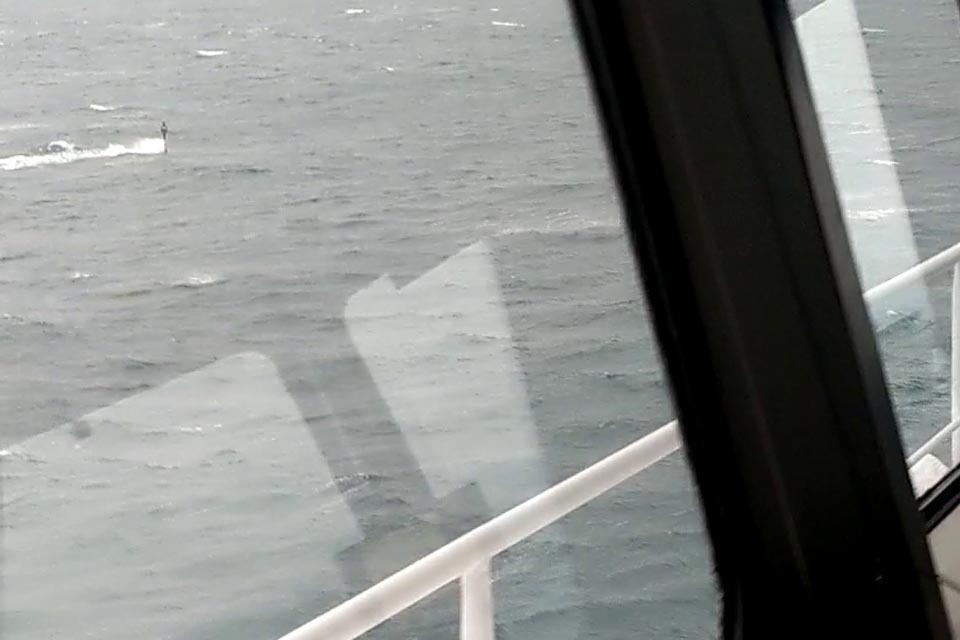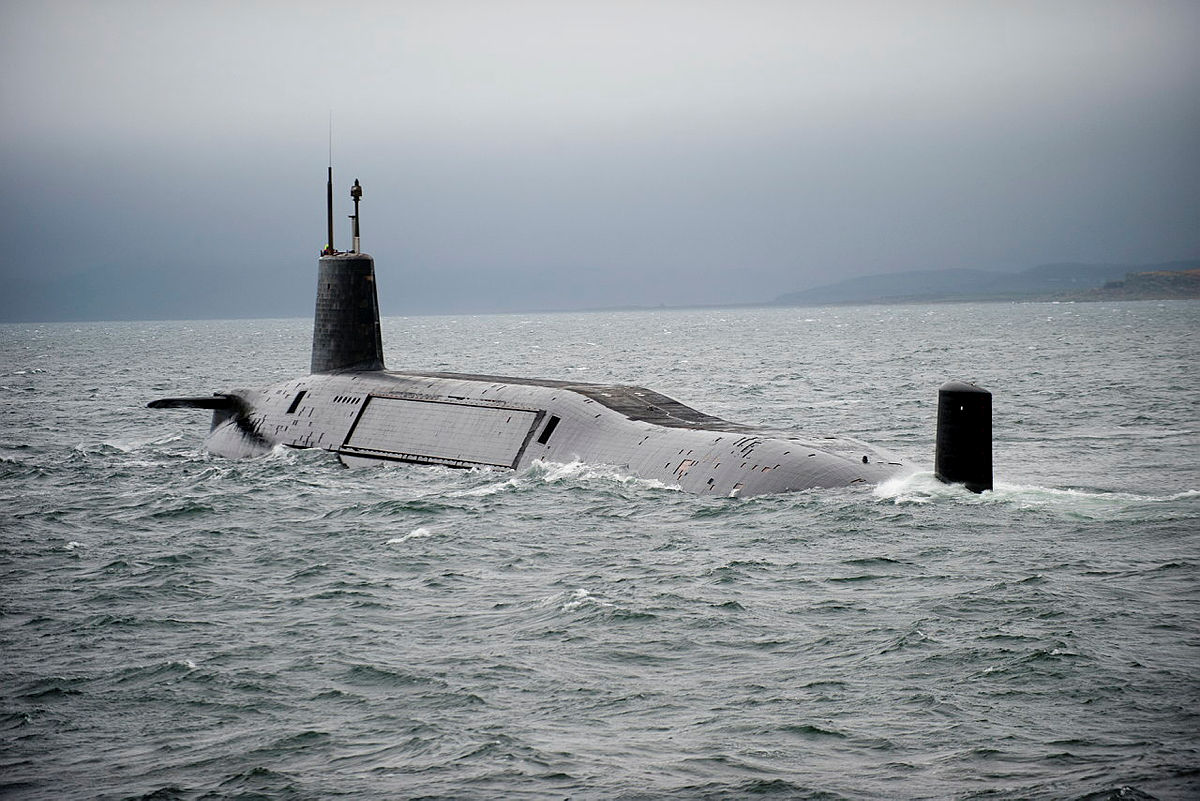The Royal Navy has refused to say whether anyone was disciplined following an incident in which a nuclear submarine nearly crashed into a ferry carrying 282 people off the Scottish coast.
The navy also won’t say whether it carried out an independent review to reduce the risks of future collisions. This was recommended by government investigators concerned about the near-miss and two other nuclear submarine crashes.
Campaigners accuse the navy of using the excuse of national security “to cover up dangerous incompetence”. The Scottish National Party (SNP) condemns the secrecy as “absolutely untenable”.
The navy says it has tightened its procedures, insisting that “appropriate action” was taken. But it would be “inappropriate” to comment on individual cases, it adds.
On 6 November 2018 a naval submarine based at Faslane near Helensburgh came within 50 to 100 metres of a Stena Superfast ferry crossing from Belfast to Cairnryan in Dumfries and Galloway. The ferry was carrying 215 passengers and 67 crew.
The incident became public in January 2019 when the UK Government’s Marine Accident Investigation Branch (MAIB) announced it was launching an inquiry. Its report, published in July 2020, blamed the Royal Navy for putting the ferry “in immediate danger”.
A collision was only avoided because a ferry officer spotted the submarine’s periscope peeping out of the sea. This was “extremely fortunate”, the MAIB report concluded, as it led to the ferry quickly altering course.

There had been a “serious risk” of a crash, the report said. “Given the relative speed and movement of the two vessels, there was every chance that the ferry would have suffered significant underwater damage.”
The report criticised the submarine crew for making key safety decisions such as turning towards the ferry and staying at periscope depth “based on inaccurate information”. It also highlighted similarities with two previous crashes.
In April 2015 the fishing trawler, Karen, was dragged backwards and “partially submerged” off Northern Ireland after its nets were snagged by a nuclear submarine. In July 2016 the nuclear powered submarine, HMS Ambush, collided with a merchant ship, Andreas, near Gibraltar.
MAIB blamed all three incidents on “the absence of a sufficiently accurate picture of surface shipping to support safety-critical decision-making.”
It recommended the Royal Navy (RN) conducted “an independent review” of its remedial actions to ensure they had been “effective in reducing the risk of collision between dived RN submarines and surface vessels to as low as reasonably practicable.”
The Ferret asked whether such a review had taken place and for details of its conclusions. In response the navy said that it “constantly reviews its training requirements to ensure our personnel maintain the highest professional standards.”
There is a real possibility that a Trident submarine commander and his crewmates are continuing to sail around scot-free after nearly having sunk a passenger ferry and their own submarine.
Peter Burt, nuclear researcher
A nuclear researcher and campaigner, Peter Burt, made a freedom of information request to the Ministry of Defence (MoD) asking for the final report on the near-miss incident. He also asked “what corrective or disciplinary action was taken towards the Royal Navy submarine personnel involved”.
The MoD’s response on 28 July 2021, after an internal review, failed to provide any information. Releasing the incident report “would prejudice the UK’s ability to defend itself” and undermine “national security”, it said.
On disciplinary action, the MoD refused to confirm or deny whether any information was held in order to protect “personal information”. It was not in the public interest to release information which could lead to submarine officers being identified, it argued.
Burt disputed the need for secrecy. “Astonishingly, the navy seems to be more interested in covering up for its own officers rather than showing the public that action has been taken to prevent such an incident from happening again,” he said.
“We have to consider the sobering thought that there is a real possibility that a Trident submarine commander and his crewmates are continuing to sail around scot-free after nearly having sunk a passenger ferry and their own submarine.”
He argued there was “no logical reason” to say nothing about action against officers. “It’s hard to avoid the conclusion that national security is being used as a pretext to cover up dangerous incompetence,” he added.
The SNP’s defence spokesperson at Westminster, Stewart McDonald MP, demanded greater accountability. “When faced with legitimate questions in the public interest the MoD’s response is always obfuscation and secrecy,” he told The Ferret.
“It is absolutely untenable. The MoD cannot keep hiding behind no comment policies when military and civilian lives have been repeatedly endangered by the inability of the Royal Navy to provide accurate pictures of surface shipping.”
The repeated crashes and near misses demonstrated the the need for an armed forces representative body to enable concerns to be raised outside the chain of command, McDonald said.
The 50-strong UK and Ireland group of nuclear-free local authorities described the ferry near-miss as “alarming” and called on the MoD to put its house in order. “It beggars belief that the MoD have, yet again, hidden behind secrecy laws,” said the group’s chair, Green councillor David Blackburn.
“The public surely has a right to know that the officers on board have been trained to stop such incidents happening again. Once again the use of national security is being used as an excuse to deflect from the MoD’s poor safety record.”
We have already taken action to tighten our training and procedures.
Spokesperson, Royal Navy
The Royal Navy said it had accepted the recommendations of the report and took action in 2018 to prevent a re-occurrence. The 2020 MAIB report listed eight measures that had been put in place.
“Appropriate action was taken in this case. It would be inappropriate to comment any further on individual cases,” the navy said.
It also declined to confirm which submarine nearly hit the ferry. Reports suggested it was a Vanguard-class boat, which can be armed with Trident nuclear missiles, possibly HMS Vengeance.
“We do not comment on submarine operation matters but can confirm there were no nuclear safety issues during this incident,” said a navy spokesperson.
“Ensuring safety at sea is a top priority for the Royal Navy, which is why we welcome this report and have already taken action to tighten our training and procedures.”
The Ferret reported in July that the MoD had been allowed to keep annual reports about nuclear weapons safety secret. The reports have previously revealed 86 “regulatory risks”, including shortages of nuclear engineers.
The freedom of information response from the Ministry of Defence
Cover image © Ministry of Defence 2012.














